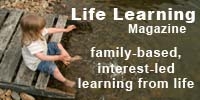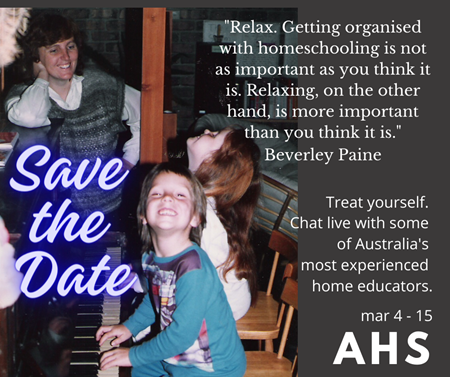|
Using Checklists To Help Plan and Record Your Homeschool Schedule and Learning Program
© Beverley Paine, Nov 2007
Early in our home educating life I prepared a relatively structured learning program for each of my children which included the setting up of learning centres in our living space. Each child had their own tray within which they kept their subject related work and text books. To monitor progress I created personalised checklists designed to be completed by each of the children.
The checklist was used as a guide to the type of activities expected to be completed each week. This was a 'contract' between the child and myself, and formed what I called the 'skeleton' of the children's educational program. Other activities also happened and 'fleshed' out our curriculum. These other activities and learning tasks were recorded in our homeschooling diary and on our family calendar, together with anecdotal information. Each child also had a scrapbook in which I pasted examples of their work (this was in pre-internet days).
This image of one of our checklists below is extensive and reflects a very structured approach to home education. It helped to build my confidence as an educating parent. Over time our I began to recognise how much my children learned when we weren't following such a structured approach and we began to trust that life learning naturally covered the curriculum.
Although preparing a personalised checklist was quite a task, filling it out only took a few moments each day. I printed blank ones and kept them on file for future use. The children kept copies of past checklists in their evaluation portfolios.
Checklists can relate specifically to skills, activities in different subject areas, content or knowledge, attitudes, chapters or sections in text books, excursion ideas.... almost anything to do with your learning program.
Checklists are quick and convenient ways to monitor the type and amount of work done, but seldom reflect the true learning experiences occurring. The example offered is a simple tick sheet, but they can include space for comment if desired.
Most checklists are an important part of the evaluation process, but they still need to be used in conjunction with more detailed recording. They are most useful for helping you to remember specific learning events when you don't have time to write in your journal, or recall specific learning situations to record as anecdotal accounts at the end of the day. Working from a checklist such as the example shown, with its lists of types of activities in the different learning areas, are particularly helpful in this way.
Checklists can be used by the children as a planning and recording aide. They can help children remember what tasks they need to do, and when. They help children learn self discipline and organisation, and encourage responsibility for their own learning programs.
This and other checklists and methods to record and evaluate children's learning while home educating can be found in Getting Started with Home School Practical Considerations, available from Always Learning Books.


Was this article helpful? Was it worth $1.00 to you?
Your gift of $1 or more helps to keep this site operating
offering encouragement
and reassurance to families
wanting
better outcomes for their children.



Beverley Paine with her children, and their home educated children, relaxing at home.
Together with the support of my family, my aim is to help parents educate their children in stress-free, nurturing environments. In addition to building and maintaing this website, I continue to create and manage local and national home educating networks, help to organise conferences and camps, as well as write for, edit and produce newsletters, resource directories and magazines. I am an active supporter of national, state, regional and local home education groups.
"You've been an inspiration to me, I love the way
you really listen to people." Vanessa
"Whenever I read your writing I always come away
with increased confidence in my ability to provide and
share a wonderful learning journey with my family!" Davina
"Your guidance, understanding, support and words of
wisdom changed our lives. We now offer support and
organise many homeschooling events for others." Lesley
"Thank you once again for your prompt and friendly service.
I am convinced that your books are going to add
quality and peace of mind to my journey of teaching my kids
at home! Just from studying your website, until almost
2am
in the morning, I 've been encouraged!" Louisa
"Thank you for all your many,many reassuring words
over many, many years. You probably don't know exactly how
valuable you are to the Australian Home Education community.
I've been reading your stuff for maybe 8 years or more now.
And I'm very grateful." Gythaa


CLICK HERE
if you want to learn
how to write your own education plans
to suit
your unique children's
individual learning needs?
Or you are looking for quality curriculum and teaching tips...
|
|
Welcome to the World of Home Education
and Learning without School!
We began educating our children in 1985, when our eldest was five. In truth, we had helped them learn what they need to learn since they were born. I am a passionate advocate of allowing children to learn unhindered by unnecessary stress and competition, meeting developmental needs in ways that suit their individual learning styles and preferences. Ours was a homeschooling, unschooling and natural learning family! There are hundreds of articles on this site to help you build confidence as a home educating family. We hope that your home educating adventure is as satisfying as ours was! Beverley Paine
3 ESSENTIAL STEP BY STEP GUIDES
Let experienced home educators Beverley, Tamara and April walk you through HOW to create a learning plan that builds on solid foundations that works for YOUR family AND ticks all the boxes for home educaton registration!
|

Tap into Beverley's
experience
through her books
"Your books, your blogs helped me beyond words... they helped me to find comfort in knowing it is ok to choose exactly what is best for my family." Nisha
"Your books and information are mind blowing and already I am feeling good about this new experience." Diane
"Your guidance, understanding, support & words of wisdom changed our lives." Leslie
"I feel specially inspired by Beverley's words and, the more I read her comments, the more inspired I feel, since my need for support, respect for different parenting styles, and information are fully met." Marijo
|
 |
|

The information on this website is of a general nature only and is not intended as personal or professional advice. This site merges and incorporates 'Homeschool Australia' and 'Unschool Australia'.
The Educating Parent acknowledges the Traditional Aboriginal and Torres Strait Islander Owners, the Custodians of Australia, and pay our respects to Elders past and present and extend that respect to Aboriginal and Torres Strait Islander people viewing this website.

Advertise on this site.













Australia's premier online annual conferences, lifetime access to video and audio recordings, freebies, notes and associated resource guides.
EVERY SUMMIT IS UNIQUE!
$29 each  2023 2023   2022 2022   2021 2021
$25 each  2020 2020  2019 2019   2017 2017
"Biggest and best Aussie homeschool event of the year!"

Home education is a legal alternative
to school education in Australia.
State and Territory governments are responsible
for regulating home education and have different
requirements, however home educating families
are able to develop curriculum and learning programs
to suit the individual needs of their children.

Without revenue from advertising
by educational suppliers and Google Ads
we could not continue to provide information
to home educators. Please support us by letting
our advertisers know that you found them on
The Educating Parent. Thanks!
|
![]() About
About
![]() Blog
Blog
![]() Articles
Articles
![]() Curriculum
Curriculum
![]() Resource Directory
Resource Directory
![]() Shop
Shop
![]() Kids Pages
Kids Pages
![]() Facebook
Facebook

![]() SA
SA ![]() VIC
VIC ![]() NSW
NSW ![]() QLD
QLD ![]() TAS
TAS ![]() ACT
ACT ![]() NT
NT ![]() NSW
NSW ![]() QLD
QLD ![]() SA
SA ![]() WA
WA ![]() TAS
TAS ![]() ACT
ACT ![]() NT
NT 






















